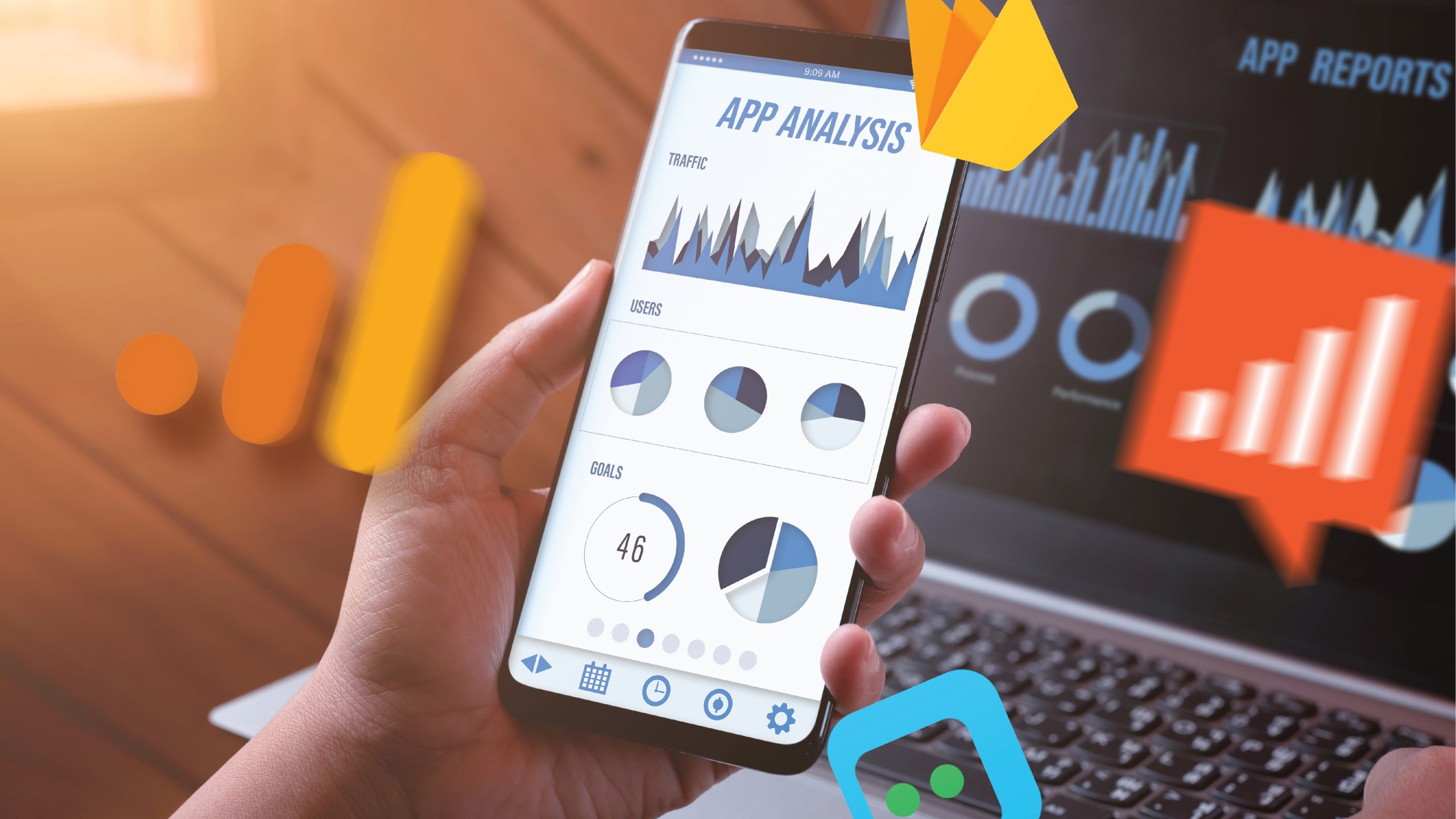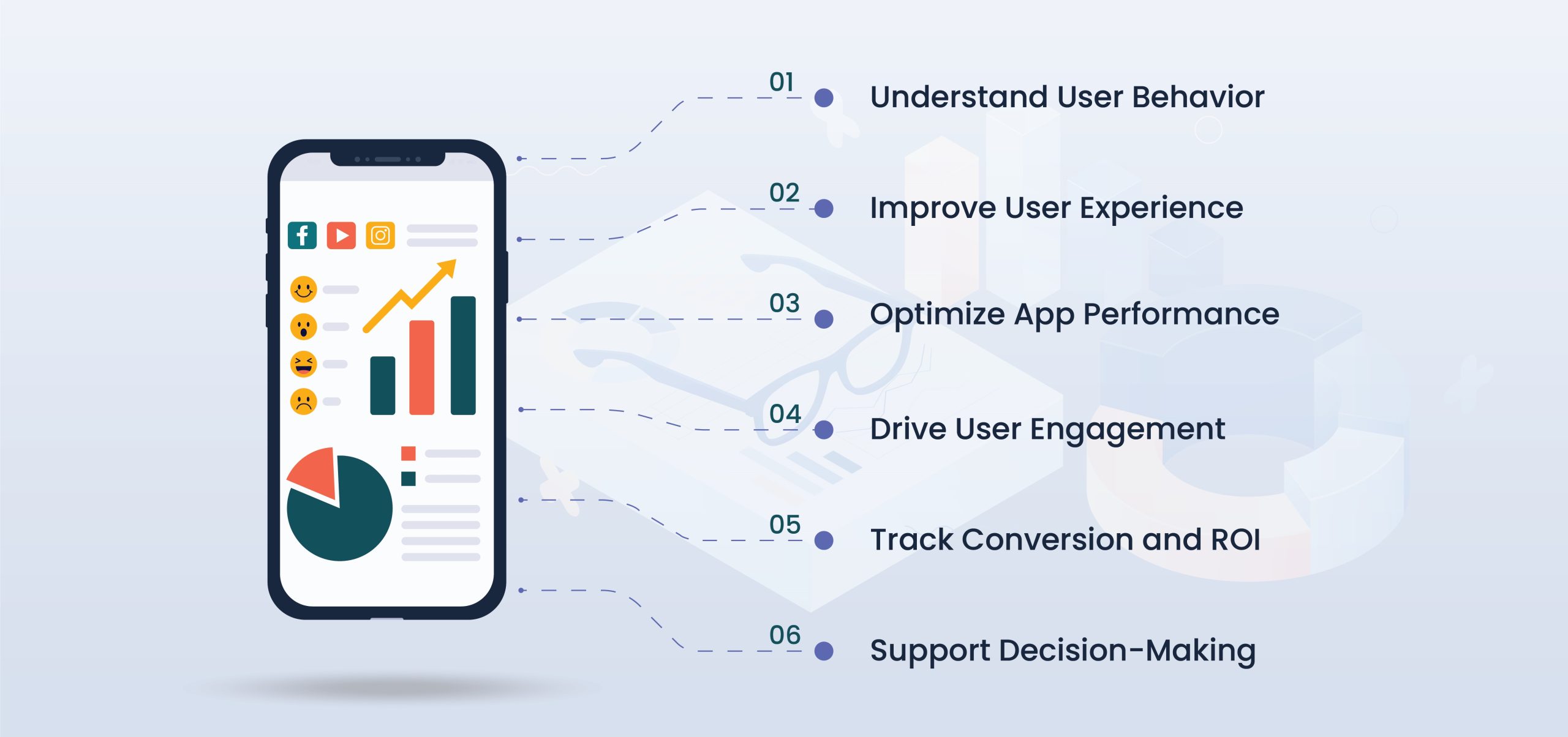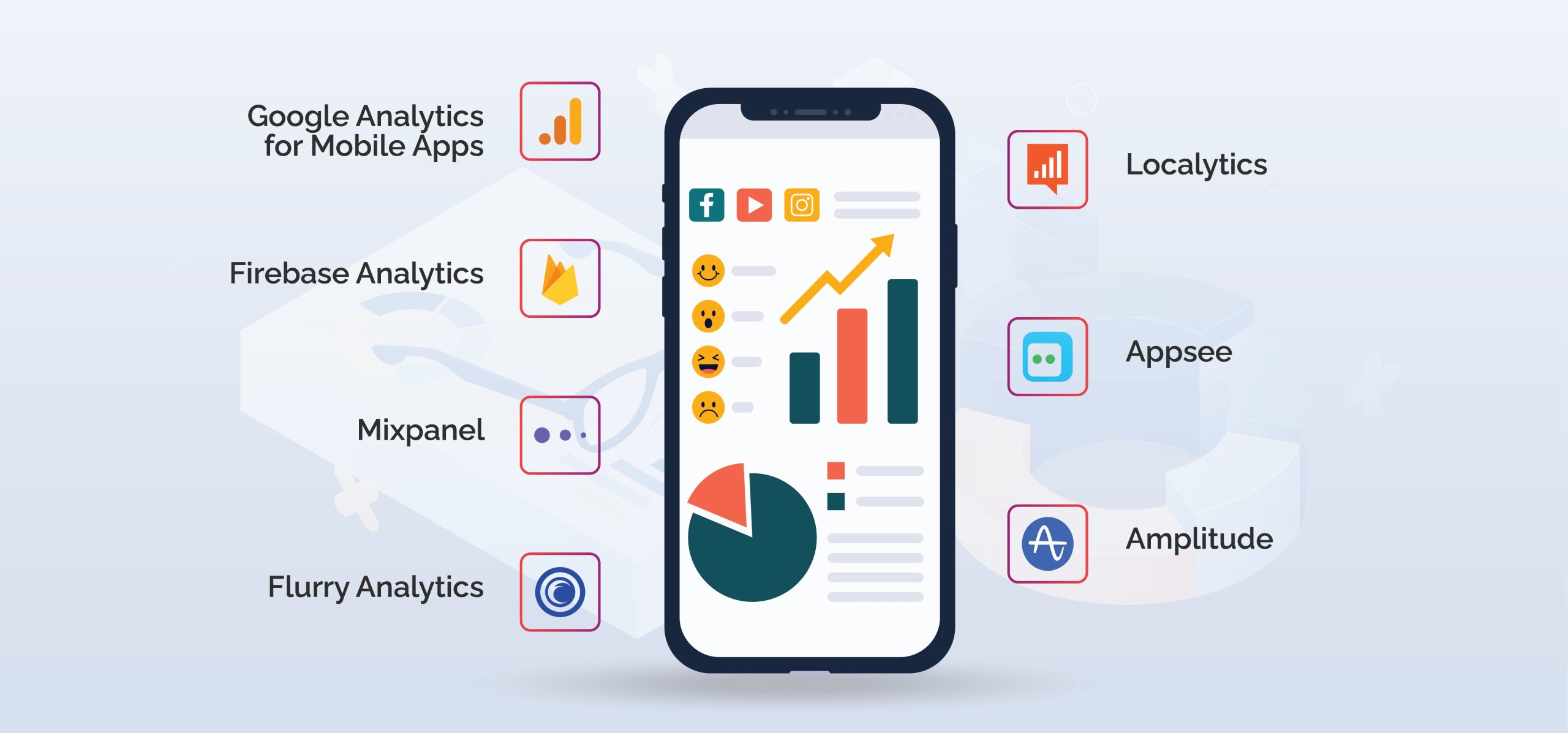Game-Changing Insights: How Mobile App Analytics Transforms User Experience
“Cracking the App-o-sphere Code!” How frequently has this notion sparked your imagination in recent times? Mobile applications have transcended the realm of mere opportunities for entrepreneurs and become an integral part of our daily lives. However, a pressing inquiry lingers: “Why do numerous apps falter and fade away each year?” The answer lies within a single word: mismanagement. Fortunately, we now possess a formidable array of mobile app analytics tools, illuminating the mysterious landscape of user behavior and paving the way to triumphant success.

Mobile app analytics: The trusted ally of developers. A beacon of wisdom, guiding you towards unlocking the full potential of your users’ behavior and optimizing your app to conquer your objectives. Imagine stumbling in the dark, grasping at straws without the illuminating power of mobile app analytics, devoid of the data-driven insights that validate your experiments.
Thus, it becomes paramount for developers to grasp the inner workings of their mobile app analytics, for within lies the key to charting progress and blazing a trail toward the goals.
What Is Mobile App Analytics?
Mobile app analytics refers to gathering, measuring, and interpreting data from mobile applications. It involves the use of specialized tools and techniques to extract valuable insights into user behavior, app performance, and overall user experience. These mobile app analytics tools enable developers and businesses to track various metrics, such as user engagement, retention rates, conversion rates, and in-app activities.
For example, We at Black Widow Tech, the leading custom mobile app development company in the USA utilize mobile app analytics tools to monitor how users interact with the apps we create. By analyzing data related to user demographics, user paths, and feature usage, we identify areas for improvement, optimize user experiences, and make informed decisions to enhance the overall performance and success of the mobile apps.
Why Do You Need Mobile App Analytics?
The rise of mobile technology has revolutionized the online world, with staggering statistics to support its dominance. Presently, mobile devices account for a remarkable 72% of all online sales, a significant leap from the 52.4% recorded in 2016. The mobile retail sector generates a massive turnover of $3.56 trillion, while mobile gaming reigns supreme, contributing over $50 billion to the overall gaming revenue.
Regardless of whether your business model revolves around mobile platforms or if your app serves as an extension of your online presence, fostering a direct relationship with your customers, there are objectives you’ll undoubtedly strive for:

- Understand User Behavior: Mobile app analytics provides insights into how users interact with your app. It helps you understand user behavior, preferences, and engagement patterns. This knowledge enables you to make data-driven decisions and optimize the user experience accordingly.
- Improve User Experience: By analyzing app analytics, you can identify pain points, usability issues, or areas where users may be getting stuck. This information allows you to make necessary improvements, enhance app functionality, and provide a seamless and enjoyable user experience.
- Optimize App Performance: Mobile app analytics helps you monitor and measure key performance indicators (KPIs) such as app crashes, loading times, and response rates. With this data, you can identify bottlenecks, and performance issues, and optimize your app for better stability and performance.
- Drive User Engagement: Analytics data reveals user engagement metrics such as session duration, screen flow, and feature usage. By analyzing this data, you can determine which app features are popular among users, optimize them, and develop strategies to drive user engagement and retention.
- Track Conversion and ROI: For businesses, mobile app analytics provides insights into user acquisition, conversion rates, and in-app purchases. It helps track the effectiveness of marketing campaigns, measure return on investment (ROI), and identify opportunities to improve conversion funnels and drive revenue.
- Support Decision-Making: Mobile app analytics empowers informed decision-making. By leveraging data-driven insights, you can prioritize development efforts, allocate resources effectively, and make strategic decisions to meet user needs, improve app performance, and achieve business goals.
Overall, mobile app analytics is crucial for understanding user behavior, improving user experience, optimizing app performance, driving engagement, tracking conversion, and making informed decisions to enhance the success and effectiveness of your mobile app.
Mobile App Analytics Best Practices
When it comes to mobile app analytics, there are several best practices to ensure effective implementation and utilization of the data. Here are some key guidelines:
- Define Clear Goals: Clearly outline your objectives and key performance indicators (KPIs) before diving into analytics. It will help you focus on relevant metrics that align with your app’s purpose and desired outcomes.
- Choose Relevant Metrics: Select metrics that provide meaningful insights into user behavior and app performance. Avoid tracking excessive metrics that may clutter your analysis and distract from actionable insights.
- Set Up Tracking Properly: Implement tracking codes or software development kits (SDKs) correctly within your app to collect accurate data. Make sure to track essential events, user actions, and conversions that align with your goals.
- Segment and Analyze Data: Segment your user base based on demographics, behaviors, or other relevant factors to gain deeper insights into specific user groups. Analyze data from different segments to identify patterns, trends, and areas for improvement.
- Focus on User Engagement: Measure user engagement metrics such as session length, frequency of app usage, and in-app activities. It helps you understand how users interact with your app and identify features or content that drive engagement or need improvement.
- Monitor Retention Rates: Track user retention rates over time to assess the stickiness of your app. Identify potential drop-off points in the user journey and implement strategies to improve user retention and minimize churn.
- Utilize A/B Testing: Experiment with different variations of app features, layouts, or content to gauge their impact on user behavior and performance. A/B testing helps you make data-driven decisions and optimize your app based on user preferences.
- Regularly Analyze and Iterate: Continuously monitor your app analytics, analyze trends, and make data-driven decisions to iterate and improve your app over time. Regularly reviewing and acting upon analytics insights ensures ongoing optimization and success.
- Privacy and Data Security: Prioritize user privacy and comply with applicable data protection regulations. Ensure that your analytics practices respect user consent and safeguard their personal information.
- Stay Updated and Adapt: Keep up with industry trends, new tools, and emerging technologies in mobile app analytics. Continuously refine your analytics strategy and adapt to changing user behaviors and market demands.
By following these best practices, you can leverage mobile app analytics effectively to drive informed decision-making, enhance user experiences, and achieve your app’s goals.
What Are The Best Mobile App Analytics Tools?
There are numerous mobile app analytics tools available in the market, each with its own set of features and capabilities. Here are a few popular ones:

- Google Analytics for Mobile Apps: Google Analytics offers a comprehensive suite of tools specifically designed for mobile app analytics. It provides insights into user behavior, acquisition channels, conversion tracking, and user retention. It also integrates well with other Google services.
- Firebase Analytics: Firebase Analytics, a part of the Firebase platform by Google, offers real-time app analytics, user attribution, and audience segmentation. It allows tracking of in-app events and user engagement and provides detailed user demographics.
- Mixpanel: Mixpanel is a powerful analytics tool that enables tracking of user interactions and engagement within mobile apps. It offers advanced features like funnel analysis, A/B testing, and user segmentation. Mixpanel provides in-depth insights to help optimize user experiences and drive growth.
- Flurry Analytics: Flurry Analytics, now a part of Verizon Media, provides comprehensive mobile app analytics, including user acquisition tracking, engagement metrics, and user behavior analysis. It offers user retention analysis, audience segmentation, and push notification performance tracking.
- Localytics: Localytics offers a wide range of analytics features, including user profiling, personalized messaging, and attribution tracking. It provides insights into user behavior, conversion funnels, and engagement metrics, helping optimize user experiences and drive app growth.
- Appsee: Appsee specializes in qualitative mobile app analytics, offering session recordings, touch heatmaps, and user journey analysis. It helps understand how users interact with the app, identify usability issues, and optimize the user interface.
- Amplitude: Amplitude focuses on user behavior tracking and provides insights into user retention, funnel analysis, and cohort analysis. It offers advanced features like behavioral segmentation, predictive analytics, and real-time data visualization.
These are just a few examples of popular mobile app analytics tools available. The choice of the app analytics tool depends on your specific needs, budget, and the level of insights you require for your app analytics strategy.
Mobile App Analytics and User Tracking
Mobile app analytics and user tracking are two interconnected concepts that play a crucial role in understanding and optimizing the performance of a mobile application.
Mobile app analytics involves the collection, measurement, and analysis of data related to user interactions, behaviors, and app performance within a mobile application. It encompasses various metrics and data points that provide insights into how users engage with the app, what features they use, how long they spend in the app, and other relevant aspects. The goal of mobile app analytics is to gain a deeper understanding of user behavior and preferences, identify areas for improvement, and make data-driven decisions to enhance the user experience and achieve business goals.
User tracking, as a part of mobile app analytics, refers to monitoring and recording user activities and events within the app. It involves capturing and tracking specific user interactions, such as button clicks, screen views, in-app purchases, and other predefined events. By implementing user tracking mechanisms, developers can collect detailed data on user behavior, enabling them to analyze user journeys, identify patterns, and measure the effectiveness of app features and functionalities.
User tracking can be accomplished through the integration of tracking codes or software development kits (SDKs) into the mobile app. These tracking mechanisms generate event data that is sent to an analytics platform or server, where it is processed, aggregated, and made available for analysis and reporting.
The collected data from user tracking can provide valuable insights, such as the most popular app features, user engagement levels, conversion rates, user retention, and other key performance indicators. This information allows developers and businesses to evaluate the app’s success, optimize user experiences, personalize content, and make informed decisions regarding updates, feature enhancements, and marketing strategies.
It’s important to note that user tracking should be conducted with respect to user privacy and compliance with relevant data protection regulations. Developers should obtain proper user consent and adhere to privacy policies to ensure the responsible and ethical use of user data in accordance with legal requirements.
Black Widow Tech, a renowned mobile app development company in the USA, is your ultimate partner in crafting and launching a successful mobile app. With our expertise and dedication, we guide you through every step of the app development process, from conceptualization to post-launch support. Our skilled developers work closely with you to understand your unique requirements and bring your vision to life. Using cutting-edge technologies and industry best practices, they build a high-quality, user-friendly app that meets your business objectives.
But the support doesn’t end there. We recognize the significance of mobile app analytics and user tracking in maximizing your app’s potential. That’s why we equip your app with robust analytics tools, allowing you to gain valuable insights into user behavior, engagement, and app performance. You can harness the power of mobile app analytics to measure your app’s success, identify areas for improvement, and make data-driven decisions. By implementing effective user tracking mechanisms, you will have a clear understanding of how users interact with your app, enabling you to optimize the user experience and drive user engagement.
Choosing us guarantees a seamless journey from app ideation to post-launch success.
